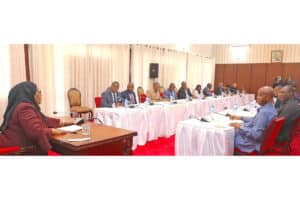
Unguja. Zanzibar’s First Vice President, Mr Othman Masoud Othman, has said that the prevailing calm on the Isles should not be mistaken for peace, noting that many citizens are calling for leadership change and reforms that promote practical accountability.
Speaking on Thursday, 17 April 2025, during a meeting with the acting United States Ambassador to Tanzania, Mr Andrew Lentz, Mr Othman said that Zanzibaris have long expressed a strong desire for meaningful political transformation. “The cries of the people are a powerful voice that cannot be silenced. They are calling for change—reforms that bring accountability in action, not just in words,” he said.
Mr Othman said that while Zanzibar has significant economic potential, what has been lacking are strong and sustainable governance foundations.
On the matter of peace, he noted: “Peace cannot be forced. When peace is imposed, it is a sign that justice has not been served. What we have in Zanzibar is not genuine peace, but silence rooted in restraint.”
He emphasised that for Zanzibar’s service-based economy to grow, true peace and trust are essential, especially for attracting investment.
Earlier, Ambassador Lentz reiterated the United States’ commitment to promoting peace through free and fair elections, and strengthening the Government of National Unity (GNU) in Zanzibar. He said the US interest in Zanzibar stems not from its size, but from its experience in diplomacy and longstanding international relations.
Earlier during his visit, Ambassador Lentz met with Zanzibar President Dr Hussein Mwinyi, who assured the US that the upcoming General Election will be conducted peacefully and in the interest of national development.
Dr Mwinyi told the ambassador that the Zanzibar government values the existence of the GNU, noting that it has fostered unity, peace, and cohesion among citizens with diverse political beliefs.














